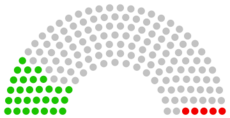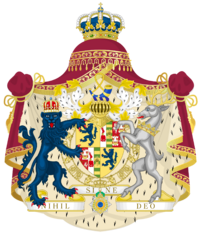Reichssenat: Difference between revisions
| Line 83: | Line 83: | ||
====Consent laws==== | ====Consent laws==== | ||
In the case of laws requiring approval, the constitution provides the Reichssenat members with three choices: | |||
* He/she agrees to the law, | |||
* he/she demands that the Mediation Committee be summoned, and | |||
* he/she doesn't agree to the law. | |||
If no agreement can be reached in the Mediation Committee and the Reichssenat doesn't agree to this result or if the Reichssenat decides on a rejection without the Mediation Committee, the law has failed, if further appeals to the Committee, either by the government or Reichsrat, lead to the same result. The Mediation Committee can therefore be convened three times (by the Reichssenat, Reichsrat and government) and has to state its decision within a "reasonable frame of time". | |||
====Opposition laws==== | ====Opposition laws==== | ||
Revision as of 14:23, 3 September 2020
This article is incomplete because it is pending further input from participants, or it is a work-in-progress by one author. Please comment on this article's talk page to share your input, comments and questions. Note: To contribute to this article, you may need to seek help from the author(s) of this page. |
Mascyllary Reichssenat Maskillischer Reichssenat | |
|---|---|
| Leadership | |
Vice President | Dietmar Kranz, ABP since 17 November 2018 |
| Structure | |
| Seats | 163 |
 | |
Political groups | Government (29)
Neutral (129)
Opposition (5)
|
| Elections | |
| Mixed-member proportional representation (MMP) | |
Last election | 1 October 2016 |
Next election | February 2021 |
| Meeting place | |
 | |
| Former Elbgau Council building, Königsreh, Mascylla | |
The Reichssenat (Hesurian pronunciation: [ˈʁaɪçsse:na:t], ‘Imperial Senate’) is the federal parliament of the subnational divisions and upper house of the legislature of Mascylla. The Reichsrat is a legislative body that represents the 21 Reichsländer and Freie Städte, consisting of 163 members known as Representatives of the Reichssenat (Repräsentanten des Reichssenats), which are decided through a chosen delegation of the represented state, and or a general election every six years. The composition of the delegation varies from the state's population, political makeup and ruling majority (or coalition) of each state legislature.
Since its foundation in 1789 under the Kingdom of Aldia in Augusthal, it has met in various location, and today sits at the former Elbgau Council building in Königsreh. It is represented by the office of the President of the Reichssenat (Präsident des Reichssenats), currently occupied by Egon Weidmann since 2019, of which its holder is directly voted from the Reichssenat itself. Representatives of the Reichssenat are usually chosen by a state-own delegation, but can be partially subject to popular vote by the state's population as well. The Reichssenat can operate with a minimum number of 160 seats, whith the number of delegation seats per state dependent on its population to achieve proportional representation. An unique occasion where an Election Day can be called earlier than two years after the last election arises when the Prime Minister loses a vote of confidence and asks the President of the Reichssenat to dissolve the parliament in order to allow new state elections afterwards.
During the War of the Five Kings, the Reichssenat was the offical assembly of the sovereigns and elected commoners of the states which were part of the Elbau Confederation (1793–1798). When Mascylla was founded, it became the established, sometimes described, upper house of parliament.
Tasks and duties
The role of the Reichssenat is described by Article 43 and 44 of the Constitution of Mascylla as follows: "Through the Reichssenat, the states and free cities participate in federal legislation and administration and in matters relating to governmental policy and decisionmaking." The states, represented by their respective governments and legislatures, operate in the Reichssenat and are able to shape and influence the aforementioned fields, while the styles of such participation are not determined and therefore ambiguous.
The National Council (Nationsrat) in 1793 frst proposed the name Länderkammer ('Chamber of States'), in tandem with the also proposed name Volkskammer ('Chamber of the People') for the Reichsrat, but it was later rejected in favor of its current terminology. Today still the Reichssenat is referred to as an "second house" or "Länderkammer" and in some cases as a full fledged upper house of legislature internationally. However, the Reichssenat is described as a sovereign constitutional body according to the constitution and in opposition to most countries "is not a second chamber of a uniform legislative body that would be set equal to the 'first chamber' regarding lawmaking."
Legislation
The Reichssenat has the valified right of legislative initiative together with the Government of Mascylla and Reichsrat. If the body decides on a law proposal, it will first be forwarded to the government, which is then entitled to comment and suggest changes to it. As a rule, the draft and the opinion regarding it must be submitted to the members of the Reichsrat within six and in certain cases more than nine weeks after the initial proposal. Law proposals of the government are first submitted to the Reichsrat, who also review and state their opinion on it. Here, the deadline of six to nine weeks still applies. The government can also counter a statement of the Reichssenat by a counter remark, before it submits the proposal to the Reichsrat for review.
The involvement of the Reichssenat in the so-called 'second round' differs in terms of whether the law passed by the Reichssenat requires the consent of the Reichsrat in order to be approved. One such law is called the "Zustimmungsgesetz" ('approval-required law'). All other laws can be rejected or called into question by the Reichssenat through a jury of delegates, the Vermittlungsausschuss ("Mediation Committee"). These laws are therefore called "Einspruchsgesetze" ('objection laws').
The necessity of a law to be approved is made apparent by the constitution and names three kinds of laws:
- Laws regarding the rewriting or change of an article of the constitution (here a two-thirds majority is required),
- laws able to influence the economies or finance of the states, for example taxation laws and production standards, and
- laws affecting the sovereignty and autonomy of the states
According to the "uniform thesis" (Einheitsthese) confirmed by the High Court of the Realm, the need for consent always extends to the law in its legal entirety and not just to individual provisions that trigger the need for consent, having been introduced by the High Court in 1968 following a constitutional amendment change.
Consent laws
In the case of laws requiring approval, the constitution provides the Reichssenat members with three choices:
- He/she agrees to the law,
- he/she demands that the Mediation Committee be summoned, and
- he/she doesn't agree to the law.
If no agreement can be reached in the Mediation Committee and the Reichssenat doesn't agree to this result or if the Reichssenat decides on a rejection without the Mediation Committee, the law has failed, if further appeals to the Committee, either by the government or Reichsrat, lead to the same result. The Mediation Committee can therefore be convened three times (by the Reichssenat, Reichsrat and government) and has to state its decision within a "reasonable frame of time".
